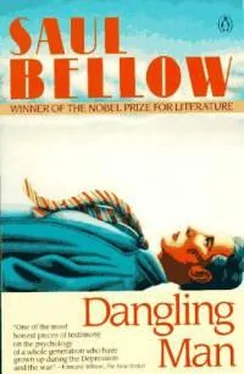Сол Беллоу - Dangling Man
Здесь есть возможность читать онлайн «Сол Беллоу - Dangling Man» весь текст электронной книги совершенно бесплатно (целиком полную версию без сокращений). В некоторых случаях можно слушать аудио, скачать через торрент в формате fb2 и присутствует краткое содержание. Жанр: Современная проза, на английском языке. Описание произведения, (предисловие) а так же отзывы посетителей доступны на портале библиотеки ЛибКат.
- Название:Dangling Man
- Автор:
- Жанр:
- Год:неизвестен
- ISBN:нет данных
- Рейтинг книги:4 / 5. Голосов: 1
-
Избранное:Добавить в избранное
- Отзывы:
-
Ваша оценка:
- 80
- 1
- 2
- 3
- 4
- 5
Dangling Man: краткое содержание, описание и аннотация
Предлагаем к чтению аннотацию, описание, краткое содержание или предисловие (зависит от того, что написал сам автор книги «Dangling Man»). Если вы не нашли необходимую информацию о книге — напишите в комментариях, мы постараемся отыскать её.
Dangling Man — читать онлайн бесплатно полную книгу (весь текст) целиком
Ниже представлен текст книги, разбитый по страницам. Система сохранения места последней прочитанной страницы, позволяет с удобством читать онлайн бесплатно книгу «Dangling Man», без необходимости каждый раз заново искать на чём Вы остановились. Поставьте закладку, и сможете в любой момент перейти на страницу, на которой закончили чтение.
Интервал:
Закладка:
And the pungency and staleness of itsstores and cellars, the dogs, the boys, the French and immigrant women, the beggars with sores and deformitieswhose like I was not to meet again until I was old enoughto read of Villon's Paris, the very breezes in the narrow85 course of that street, have remained so clear to me that I sometimes think it is the only place where I was ever allowed to encounter reality. My father blamed himself bitterly for the poverty that forced him to bring us up in a slum and worried lest I see too much. And I did see, in a curtainless room near the market, a man rearing over someone on a bed, and, on another occasion, a Negro with a blond woman on his lap.
But less easily forgotten were a cage with a rat in it thrown on a bonfire, and two quarreddling drunkards, one of whom walked away bleeding, drops falling from his head like the first slow drops of a heavy rain in summer, a crooked line of drops left on the pavement as he walked.
January..6
ABT HS sent me a copy of a pamphlet he wrote on the government of the Territories.
He expects a flattering cornment no doubt, and I shall have to rig one up. He will want me to tell him that no one else could have written such a pamphlet. Suppose I were to try to tell him what I thought of him. He would reply coldly, "I don't know what you're talking about." He has a way of turning aside every. thing he has no desire to understand.
Abt, more than anyone I have known, has lived con. tinually in need of being consequential. Early in life he discovered that he was quicker, abler, than the rest of us, and that he could easily outstrip us in learning and in skills. He felt he could be great in anything he chose. We roomed together in Madison as freshmen. He was very busy that first year keeping up all his accomplishments, his music, his politics, his class work. Living with him had a bad effect on me, for I withdrew from any field he entered. People came from other campuses to consult him on doctrinal matters; no one had as much out-ofthe-way information as he; he read foreign political journals the rest of us had never heard of, and reports of party congressesThose dun, mimeographed sheets on international decisions in France and Spain. No one was so subtle with opponents. Nor did many students get as much attention as he got from his teachers. A few were afraid of him and learned to avoid challenging him publicly. Late afternoonsHe played the piano. I would often stop by. for him at the music building on the way to dinner and spend half an hour listening. He did not waste time maturing, he did not make any of the obvious mistakes. His hold was too good. That winter he was Lenin, Mozart, and Locke all rolled into one. But there was unfortunately not enough time to be all three. And so, in the spring, he passed through a crisis. It was necessary to make a choice. But, whatever it was he chose, that would be the most important. how could it be otherwise?
He gave up attending meetings and practising the piano, he banished the party reports as trash, and decided to become a political philos. opher. There was a general purge. Everything else went.
Anti-Duhring and The Critique of the Gotha Program sank to the rear of the bottom shelf of his bookcase and were supplanted at the top by Bentham and Locke. Now he had decided, and in dead earnestness he followed greatness. Inevitably, he fell short of his models. He would never admit that he wanted to become another Locke, but there he was, wearing himself thin with the effort of emulation, increasingly angry at himself, and unable to admit that the scale of his ambition was de. feating him.
He is stubborn. Just as, in the old days, it disgraced him to confess that he was not familiar with a book or a statement that came under his jurisdiction, he now children-not acknowledge that his plan has miscarried. But then, it bothers him to be found guilty even of small errors. He does not like to forget a date or a name or the proper form of a foreign verb. I–Ie cannot be wrong, that is his di@. culty. If you warn him that there is a fissure at his feet, he answers, "no, you must be mistaken." But when it can no longer be ignored he says, "1gg.o you see it?" as thotgh he had discovered it.
Of course, we suffer from bottomless avidity.
Our lives are so precious to us, we are so watchful of waste. Or perhaps a better name for it would be the Sense of Personal lggestiny. Yes, I think that is better than avidity. Shall my life by one-thousandth of an inch fall short of its ultimate possibility? It is a different thing to value oneself, and to prize oneself crazily. And then there are our plans, idealizations. These are dangerous, too. They can consume us like parasites, eat us, drink us, and leave us lifelessly prostrate. And yet we are always inviting the parasite, as if we were eager to be drained and eaten.
It is because we have been taught there is no limit to what a man can be. Six hundred years ago, a man was what he was born to be. Satan and the Church, representing God, did battle over him. He, by reason of his choice, partially decided the outcome. But whether, after life, he went to hell or to heaven, his place among other men was given. It could not be contested. But, since, the stage has been reset and human beings only walk on it, and, under this revision, we have, instead, history to answer to. We were important enough then for our souls to be fought over. Now, each of us is responsible for his own salvation, which is in his greatness.
And that, that greatness, is the rock our hearts are abraded on. Great minds, great beauties, great lovers and criminals surround us. From the great sadness and desperation of Werthers and Don Juans we went to the great ruling images of Napoleons; from these to murderers who had that right over victims because they were greater than the victims; to men who felt privileged to approach others with a whip; to schoolboys and clerks who roared like revolutionary lions; to those pimps and subway creatures, debaters in midnight cafeterias who believed they could be great in treachery and catch the throats of those they felt were sound and well in the lassos of their morbidity; to dreams of greatly beautiful shadows embracing on a flawless screen. Because of these things we hate immoderately and punish ourselves and one another immoderately. The fear of lagging pursues and maddens us. The fear lies in us like a cloud. It makes an inner climate of darkness. And occasionally there is a storm and hate and wounding rain out of us.
January 7
ADLERT'S bureau is sending him to San Francisco for two weeks. H. e is leaving tomorrow.
Our talk will have to be put off.
John P. arl writes of an exhibit of his pictures at a women's dub in New York.
It was not a success. For want of space they crowded his things into the dining room, then held so many Red Cross luncheons that n) one could get in.
He sold nothing. A lady who admired a still life wanted to order a flower painting for her daughter's bedroomthree flowers in a blue vase.
"Only three? A fourth flower will cost you twenty-five dollars more. It'll fill the picture out. That's very reasonable." She pondered this but in the end she decided three would be enough. Her husband grew peonies; she would have the flowers and a vase sent over. "I'm sorry," Johnny said.
"I thought we were talking about roses. Peonies are too big for the price. I'll have t0. harge ten dollars extra for each flower. It's the standarl rate for flowers with a three-inch diameter. A lemon will be ten dollars more, unpeeled.
Half-peeled, fifteen dollars."
"Are there rates for everything?" she said. She had become suspicious.
"In a manner of speaking, there are. They're a little lower than the ones I quoted you. The Jones Street Convention of 1930 set them lower. But, with inflation @?
Читать дальшеИнтервал:
Закладка:
Похожие книги на «Dangling Man»
Представляем Вашему вниманию похожие книги на «Dangling Man» списком для выбора. Мы отобрали схожую по названию и смыслу литературу в надежде предоставить читателям больше вариантов отыскать новые, интересные, ещё непрочитанные произведения.
Обсуждение, отзывы о книге «Dangling Man» и просто собственные мнения читателей. Оставьте ваши комментарии, напишите, что Вы думаете о произведении, его смысле или главных героях. Укажите что конкретно понравилось, а что нет, и почему Вы так считаете.







